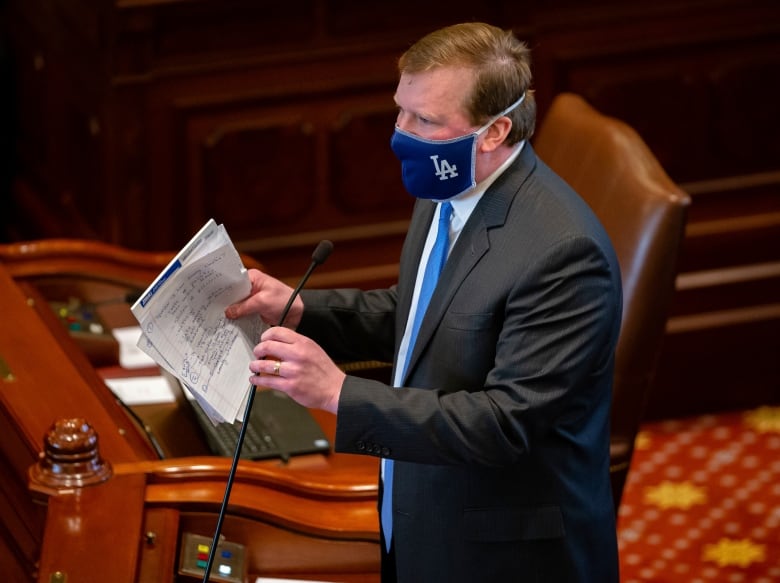
As It Happens6:32How one state is pushing back against efforts to ban books from schools and libraries
It’s about to become a lot harder to ban books in Illinois.
A bill that would, in essence, ban book bans in schools and public libraries will become the law of the land, as soon as the state’s Democratic governor signs off on it.
“For too long we have struggled with groups that really have an agenda of banning books,” Laura Murphy, an Illinois state senator who sponsored the legislation, told As It Happens guest host Helen Mann.
“This bill will ensure that, at least in Illinois, that movement will have ended, that people will have access — free access — to any books that they should choose to read.”
The bill, which would withhold funding from libraries that ban books, passed through both state legislative chambers earlier this month. It is now sitting on the desk of Gov. J.B. Pritzker, who has said he looks forward to signing it.
It comes at a time when libraries are finding themselves in the political crosshairs across much of the U.S. and parts of Canada, especially over books and programming that centre round LGBTQ themes.
How it works
In order to be eligible for state funding under the new legislation, libraries must adopt a set of principles that prohibits book bans.
They can either develop their own anti-censorship policies, or agree to follow the American Library Association’s Library Bill of Rights, which holds that “materials should not be excluded because of the origin, background, or views of those contributing to their creation,” and “should not be proscribed or removed because of partisan or doctrinal disapproval.”‘

“If you’re going to ban books, then you’re not going to be able to do it with state tax dollars,” Murphy said.
Secretary of State Alexi Giannoulias, a Democrat who spearheaded the bill, called its passage “a triumph for our democracy, a win for First Amendment rights, and most importantly, a great victory for future generations to come.”
Republican pushback
Not everyone agrees. All 19 Republicans in the Illinois Senate voted against the measure. Those who spoke out against it say it wrests control from local library boards.
Republican state Sen. Jason Plummer accused Democrats of trying “to force their extreme ideology on communities across this state.”
“The members of locally elected library boards, who work to increase literacy in their communities, don’t need a book-ban agenda foisted on them by Chicago politicians who are just trying to get cheap publicity,” Plummer said in a news release.
“It’s offensive to the ideals of good government to threaten to take public funding away from the very communities that generated that funding through their taxes.”

Illinois has three regional systems representing member libraries across the state. Two of them expressed support for the bill when reached for comment.
“While our member libraries are awaiting additional clarity on how the administrative rules for the bill will be enforced, they have expressed a lot of support for the bill,” Monica Harris, executive director of the Reaching Across Illinois Library System, said in an emailed statement.
“Illinois libraries are doing incredible work for their communities and they appreciate that the Secretary of State has taken a stand in favour of the right to read freely.”
The Illinois Heartland Library System says that while it normally refrains from commenting on partisan matters, it stands behind this bill.
“Curating collections to suit the tastes or beliefs of a single group would mean limiting others’ freedom of access — a privilege that no American holds over another,” spokesperson Carol Hogan-Downey said in an email.
The third regional system, the Chicago Public Library, did not respond to a request for comment before deadline. But on its website, it calls itself a “book sanctuary,” with a goal of “collecting and protecting” banned and challenged books and making them “broadly accessible.”
The Association of Illinois Library Educators, which represents school libraries, says on its website that it “is opposed to any attempt to force the removal of materials from school libraries.”
WATCH | How books are selected at Vancouver Public Libraries:
As libraries across the country face calls to remove books that contain content related to sexual education and LGBTQ issues, the team responsible for building Vancouver Public Library’s collection explains how books are chosen and why there should be something for everyone.
According to the American Library Association (ALA), 2022 saw a new record for attempted book bans and restrictions in the U.S.
The ALA tracked 1,200 book challenges last year, nearly double the then-record total from 2021, and by far the most since the organization started keeping data 20 years ago.
Some books were targeted by progressives because of racist language, the ALA said, including Mark Twain’s The Adventures of Huckleberry Finn. But the vast majority of complaints come from conservatives directed at works with LGBTQ or racial themes.
And it’s happening in Canada too.
The director of a Manitoba library network recently told CBC News that staff have faced harassment, calls for library funding to be revoked, and even allegations of pedophilia, over their refusal to pull three children’s sex-ed books from the shelves.
Multiple school boards in Ontario have had chaotic meetings about books with LGBTQ content.
Parental rights and protecting history
Sen. Murphy says that some American classics have come under fire in Illinois, including J.D. Salinger’s The Catcher in the Rye and F. Scott Fitzgerald’s The Great Gatsby — which she says she finds “mind-boggling.”
“When you ban books and you ban access to history, you’re in essence trying to rewrite that history,” she said.
“And I just think our history is so important to ensure we learn from it, we provide better policies, better opinions, better actions, and then we don’t repeat any mistakes that might have been made,” she said.
She says that when it comes to children’s literature, parents still ultimately have the right to decide whether or not to check out certain books.
“Nothing in this bill prohibits someone from exercising their parental rights,” she said. “But it doesn’t ban someone else from accessing that information.”
